- Home
- Tim Powers
The Anubis Gates Page 24
The Anubis Gates Read online
Page 24
But, he thought as he reached out and drew closer the Candle of Far Speaking, this is too big a thing to keep to myself. He lit it with the flame of the oil lamp on the table, and the lamp’s teardrop-shaped flame fluttered and seemed to recoil, when the little spherical fire bloomed at the tip of the magical candle’s wick.
* * *
To the minimal, insect-reflex extent that he was able to be glad about anything, the smiling young man was glad that Doctor Romany’s domination of him had not only removed his perceptibly burdensome free will, but also made an abstraction of physical discomfort. He was distantly aware of hunger, and cramped pains in his feet, and, much more distantly, of a voice that seemed to be howling in horror in the deepest cellar of his mind, but the fire of his consciousness had been doused with water so that the resulting steam could power some unimaginable engine; the few coals that still glowed could feel nothing but an anesthetized kind of satisfaction that the engine seemed to be working well.
Like a coachman instructed to ride around and around a certain block until his fare, ready at last, shall emerge from a house and hail him, the smiling young man began again at the top of the memorized page: “Good morning, my good man,” he said. “I am Lord Byron. May I buy you a pint of something?” The ever-smiling young man didn’t really hear the man’s answer—it seemed muffled, as if spoken on the other side of a partition—but some part of his brain, or perhaps the engine, recognized it as calling for reply number three: “I certainly am, my friend—sixth baron Byron of Rochdale; I inherited the title in 1798, when I was ten years old. If you’re wondering why a peer of the realm should be in a place like this, drinking with common laborers, well, it’s because I think it’s the common laborers that are this country, not the lords and royalty. I say—” There was the usual interruption that called for reply number one: “Innkeeper! A pint of whatever this gentleman will drink!” The young man’s hand, like a precision machine, fished a coin from his waistcoat pocket and dropped it onto the nearest level surface, and then his mouth picked up the number three response exactly where it had left off: “—to hell with these men who are supposed to govern us just because of the womb they happened to issue from! I say the King, and you, and me, are none of us better than the others, and it’s not right that some eat off silver and never work a day in their lives, while others just as good work backbreakingly hard every day and hardly taste real meat once in a week! The Americans rid themselves of that kind of artificial society, and the French tried to, and I say that we—”
He realized that the man he’d been reciting to was gone. When had he left? No matter—another would be along presently. He sat back, his blank smile returning to his face like something dead floating to the surface of a pond.
After a time he became aware that someone else had sat down next to him, and he started up again. “Good morning, my good man. I am Lord Byron. May I buy you a pint of something?”
He was answered with one of the sentences he had been warned he might get, and with an unfocussed uneasiness he responded with reply number eight: “Yes, my friend, I was travelling abroad until recently. I had to come home due to an illness, a brain fever, which still clouds my mind at times. Please excuse the uncertainty this infirmity plagues me with—do we know each other?”
After a long pause during which the still-smiling young man was aware of a vicarious sort of worry in himself, the man answered in the negative, and so with relief he went on. “If you’re wondering why a peer of the realm should be in a place like this, drinking with common—”
The newcomer interrupted the recital with a question that, frighteningly, was not muffled: “How are you coming with Childe Harold’s Pilgrimage?” the stranger asked. “Oh, sorry, it’s Childe Buron’s Pilgrimage at this point, isn’t it? Ah—’Whilome in Albion’s isle there dwelt a youth, who ne in virtue’s ways did take delight… ‘ How does it go from there?”
For some reason these sentences hit the young man like a splash of ice water, and as they forced his hearing into clarity they did the same for his sight; his surroundings leaped from a congeries of comfortable blurs into awful focus, and for the first time in four days he saw a face clearly.
And the face of the man who had spoken to him was one that would attract attention—perched on impressively broad shoulders and a rope-muscled neck, and framed by a thick golden mane and beard, it was haggard, lined and mad-eyed as if with fabulous and harrowing secrets.
The no longer smiling young man knew that he’d been briefed on what to do in this situation—”If things become close up, and louder,” Romany had repeatedly told him, “and you lose the veil of protection my guidance give you, return to the camp here instantly, before the people in the streets tear you to bits like a crippled dog in a ratting pit… “—But this bearded man’s words had triggered something else, something more important than Romany’s command. Byron could hear himself speaking: “‘But spent his days in riot most uncouth, and vexed with mirth the drowsy ear of night.’” A swarm of astringent memories seemed to be loosed by these somehow very familiar phrases, and they stung like circulation returning to a suddenly unconstricted limb; he remembered being aboard the brig Spider with Fletcher and Hobhouse … the Albanians at Tepaleen with their white kilts and gold-trimmed capes, their belts bristling with ornate pistols and daggers… the dry yellow hills and deep blue sky of the Morea… and something about a fever, and… a doctor? His brain shut down with an almost audible slam on that line of recollection, but his voice continued, “‘Ah me! in sooth he was a shameless wight, sore given to revel and ungodly glee; he cheered the bad and did the good affright… ‘”
A hand seemed to squeeze his throat shut, and he knew it was Doctor Romany. In his head he heard the bald-headed doctor’s order: “Return to the camp here instantly.”
He stood up, darting bewildered glances around at the other drinkers in the low-ceilinged taproom, and then, muttering apologies, limped across to the door and out onto the street.
* * *
Doyle leaped to his feet, but his new height made him dizzy and he grabbed the table for support. My God, he thought as he took a deep breath and then reeled off in pursuit of the young man, it really is Byron—he knew Childe Harold, which no one in England will see for two years. But what’s wrong with him? And what’s wrong with history? How can he be here?
He lurched to the door and hung onto the wooden frame as he stepped down to the pavement. He could see Byron’s curly-topped head bobbing through the crowd to his right, and he followed unsteadily, wishing he could make this admittedly superior body work as gracefully as Benner had.
The people in the street seemed eager to get out of the way of the lurching, mad-eyed, lion-headed giant, and he caught up with Byron at the next tavern; grabbing his elbow, he steered him forcefully inside. “Beer for me and my friend,” he said carefully to the barmaid who was blinking up at him. Damn this cut-up tongue, he thought. He marched the ineffectually resisting young man to a table and sat him down, then leaned over him with one hand gripping the back of the chair so that his muscled arm barred any escape. “Now then,” Doyle rumbled sternly, “what’s the matter with you? Aren’t you curious about how I happened to know those lines?”
“I—I have an illness, a brain fever,” said Byron nervously, his smile seeming imbecilic when coupled with his evident anxiety. “I… must go, please, I… have an illness—” The words seemed to be jerked out of him one at a time, as if they’d been knotted along a piece of string that Doyle was pulling out of his throat.
Abruptly Doyle realized where he’d seen this mindless smile before—on the faces of the cultists who he used to see begging for change in airports and out in front of all-night restaurants. I’ll be damned, he thought—Byron acts like he’s been programmed.
“What do you think of this weather we’re having?” Doyle asked him.
“Please, I’ve got to go. My illness—”
“What day is it?”
“—a b
rain fever, which still clouds my mind at times—”
“What’s your name?”
The young man blinked. “Lord Byron, sixth baron of Rochdale. May I buy you a pint of something?”
Doyle sat down in the other chair. “Yes, thanks,” he said. “Here comes the girl with it now.”
Byron took a gold coin from his pocket and paid for the beers, though he didn’t touch his. “If you’re wondering why a peer of the realm—”
“‘For he through sin’s long labyrinth had run,’” interrupted Doyle, “‘nor made atonement when he did amiss—’ Who wrote that?”
Again Byron’s smile disappeared, and he pushed his chair back, but Doyle stood up and blocked his exit again.
“Who wrote that?” he repeated.
“Uh…” Sweat broke out on Byron’s pale brow, and when he finally answered, it was in a whisper. “I… I did…”
“When?”
“Last year. In Tepaleen.”
“How long have you been in England?”
“I don’t—four days? I think I’ve been sick… “
“How did you get here?”
“How did I… “
Doyle nodded his shaggy head. “Get here. On a ship? What ship? Overland?”
“Oh! Oh, of course, I came back…” Byron frowned. “I can’t recall.”
“You can’t? Doesn’t that seem peculiar to you, that you don’t know that? And how do you think I knew those verses of yours?” I wish I had Ted Patrick here, he thought.
“You’ve read my poetry?” said Byron, his weird smile returning. “You gratify me. But it all seems childish to me now; now I am pursuing the poetry of action, the well-placed sword rather than the well-chosen word. My goal is to strike the blow that shall sever the—”
“Stop it, “said Doyle.
“—chains that restrict us from—”
“Stop it. Look, I don’t have lots of time, and my mind isn’t firing on all cylinders either, but your presence here—I need to know what you’re doing here, I need to know… oh, hell, lots of things…” Doyle’s voice was becoming a distracted whisper as he picked up his beer mug. “Whether this is the real 1810 or some fake one… “
Byron stared at him for a moment, then reached uncertainly for the other mug and brought it halfway to his mouth. “He told me not to drink,” he said.
“To hell with him,” muttered Doyle, wiping foam from his bushy moustache. “You going to let him tell you when you can have a drink?”
“To… to hell with him,” agreed Byron, though speaking with some difficulty. He took a long, deep sip, and when he lowered the mug his eyes seemed more focussed. “To hell with him.”
“Who is he?” asked Doyle.
“Who?”
“Damn it, the man who has programmed—sorry, harnessed, blinkered and saddled you?” Byron frowned in puzzlement, the new clarity in his eyes fading, so Doyle said quickly, “‘Good morning, my good man. I am Lord Byron. May I buy you a pint of something? If you’re wondering why a peer of the realm should be in a place like this’—who said all that?”
“I did.”
“But who said it to you, who made you memorize it? Those aren’t your words, are they? Try to remember who said all that to you.”
“I don’t—”
“Close your eyes. Now hear those words, but in a different voice. What’s the voice like?”
Byron obediently shut his eyes, and after a long pause, said, “Deeper. An old man.”
“What else is he saying?”
“‘My lord,’” and Byron’s voice even went an octave deeper as he quoted it, “‘these statements and replies should be sufficient to get you through these two days. But if things become close up, and louder, and you lose the veil of protection my guidance gives you, return to the camp here instantly, before the people in the streets tear you to bits like a crippled dog in a ratting pit. Now Richard will drive you to town in the wagon, and he’ll pick you up at six o’clock this evening at the corner of Fish and Bread streets. Here’s Richard now. Come in. Ready to go? Avo, rya. Rya, that toy the foreign chal brought—let’s start it up, my monkey would like to see it move. We’ll talk about that later, if you please, Richard. Right now take milord here to town.’” Byron opened his eyes wonderingly. “And then,” he added, in his own voice again, “I was in a wagon.”
Doyle kept his face impassive, but his mind was racing. God help us, it’s Romany again, he realized. What in hell is the man up to here? What can he hope to gain by brainwashing Lord Byron and turning him loose to make semi-treasonous speeches? He’s certainly making the man visible—all I had to do to find him today was follow the rumors of the lunatic lord who’s buying everybody drinks. Is he responsible for Byron being in England now? Anyway, I’ve got to hang onto this poor devil.
“Listen,” he said, “you’ve got some high-octane memories to retrieve, and we can’t do it here. I’ve got a room a few streets away—inherited it, sort of—and the people that live there aren’t inclined to be nosy. Let’s go there.”
Still dazed, Byron got to his feet. “Very well, I suppose, Mr … ?”
Doyle started to answer, then sighed. “Oh hell. I guess you can call me William Ashbless. For now. But I’m damned if I’ll stay William Ashbless for the whole ride. All right?”
Byron shrugged bewilderedly. “That’s fine with me.” Doyle had to remind him to pay for the beers, and during the brief walk to the lodging house Byron kept craning his neck at the buildings and the crowds of busy people. “I really am in England again,” he muttered. His dark eyebrows lowered in a frown that he wore for the rest of the walk.
When they’d reached the shabby building and picked their way up the stairs—which several families seemed to consider their personal chamber, swearing at the two young men and jealously hiding bits of horrible food as they climbed past—and reached the room that had once been Dog-Face Joe’s, and when they’d filled two cups from the coffee pot that was still warm over the coals in the fireplace, Byron fixed on Doyle his first alert glance of the day.
“What’s today’s date, Mr. Ashbless?”
“Let’s see… the twenty-sixth.” Byron’s expression didn’t change, so after taking a cautious sip of the coffee, he added,
“Of September.”
“That’s not possible,” Byron stated. “I was in Greece… I remember being in Greece on Saturday the, uh, twenty-second.” He shifted on his chair and bent down to pull off his shoes. “Damn, these shoes hurt,” he began, then picked one of them up and stared at it. “Where on earth did I get these? Not only are they too small, they’re about a century out of fashion. Red heels, of all things, and these buckles—! And how in God’s name could I ever have put on this coat?” He dropped the shoe and said, in a voice so tightly controlled that Doyle knew he was scared, “Please tell me the true date, Mr. Ashbless, and as much as you know of what has happened to me since I left Greece. I gather I’ve been ill. But why am I not with my friends, or my mother?”
“It is the twenty-sixth of September,” Doyle said carefully, “and all I know about your recent actions is that for the past couple of days you’ve been buying drinks for half the population of London. But I know who can tell you what’s been happening.”
“Then let’s go to him immediately. I can’t bear this—”
“He’s here. It’s you. No, listen—you were recalling verbatim conversations a few minutes ago. Do it again, and listen to yourself. Let’s see… try ‘Avo, rya.’ Remember hearing that, in a different voice.”
“Avo, rya,” said Byron, and the alertness fell out of his expression. “‘Avo, rya. He’s very kushto with it. Handled guns before, it’s clear. That’s good, Wilbur. Though he won’t need much skill—he should be only a few feet away from him when he’ll use it. Does he seem to be able to draw it with sufficient speed? I’d like to just have it in his pocket, but I’m afraid even a lord might have to submit to a search before entering the royal presence. Oh, avo, rya, th
e little holster under his arm gives him no problem. You should see him—it’s in his hand quick as a snake. And he’s shooting with no hesitation? It’s got to be automatic. Avo, the dummy is all shot to bits, he’s done it so often—’”
Byron leaped out of the chair. “Good God, man,” he exclaimed in his own voice, “I was to go kill King George! What abomination is this? I was a puppet, sleep-walking, taking these diabolical instructions as… docilely as a maid would agree to serve dinner! By God, I’ll get satisfaction for this… atrocious affront! Matthews or Davies will convey my challenge to… to …” He slammed his right fist into his left palm and then pointed at Doyle. “I think you know who.”
Doyle nodded. “I think I do. But don’t go off half-cocked here. You may as well inventory what you know before you rush into it. Tell you what—try ‘Yes, Horrabin,’ in the same voice that was asking the questions in that last conversation. Do you get anything from that?”
Though still frowning, Byron sat down again. “Yes, Horrabin.” Again his face went blank. “‘Yes, Horrabin, I’d have that one killed too. This has got to run like clockwork, and it’s conceivable he may know enough to obstruct it at some point. Better to err on the side of excessive thoroughness, eh? Incidentally, is the Antaeus Brotherhood still actually in existence? I mean, do they meet and all? If so, I say we destroy them too. They were evidently quite a thorn in our side at one time. A hundred years ago they might have been, your Worship, but it’s nothing but an old men’s club these days. I’ve heard the old stories, and it certainly sounds as if they were formidable once; they’re relics now, though, and obliterating them would only call possibly harmful attention to their history. That’s a point… very well, but post some of your people at wherever it is that these old men congregate—Off Bedford Street, your Worship, rooms above a confectioner’s—and have them report back here if they see any … oh, never mind. I’m firing at shadows. Why don’t you take his lordship here outside and run him through his lines again.’ “

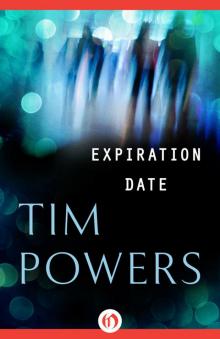 Expiration Date
Expiration Date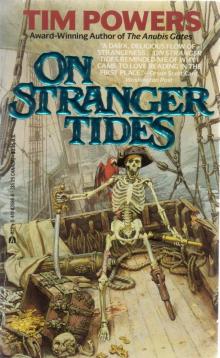 On Stranger Tides
On Stranger Tides Earthquake Weather
Earthquake Weather Forsake the Sky
Forsake the Sky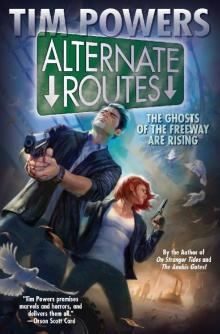 Alternate Routes
Alternate Routes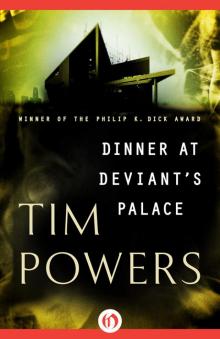 Dinner at Deviant's Palace
Dinner at Deviant's Palace The Stress of Her Regard
The Stress of Her Regard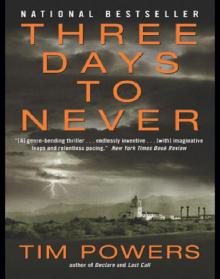 Three Days to Never: A Novel
Three Days to Never: A Novel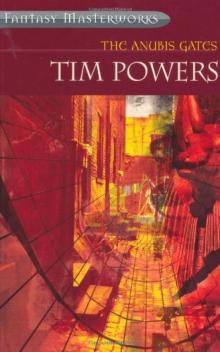 The Anubis Gates
The Anubis Gates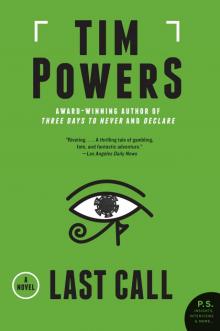 Last Call
Last Call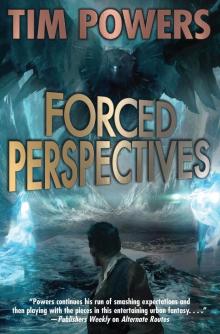 Forced Perspectives
Forced Perspectives Strange Itineraries
Strange Itineraries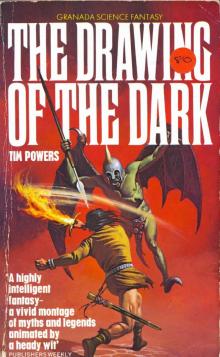 The Drawing of the Dark
The Drawing of the Dark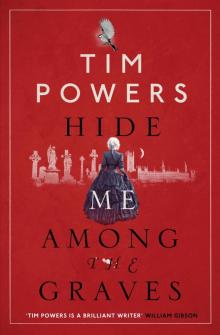 Hide Me Among the Graves
Hide Me Among the Graves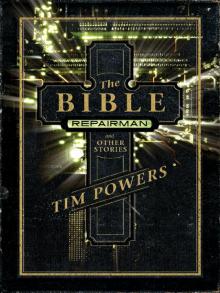 The Bible Repairman and Other Stories
The Bible Repairman and Other Stories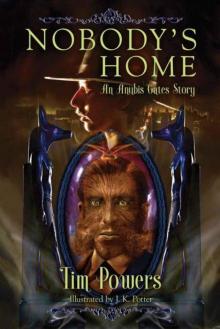 Nobody's Home: An Anubis Gates Story
Nobody's Home: An Anubis Gates Story More Walls Broken
More Walls Broken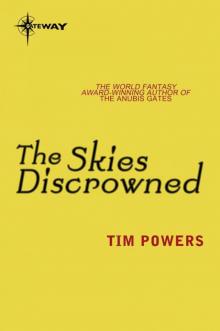 The Skies Discrowned
The Skies Discrowned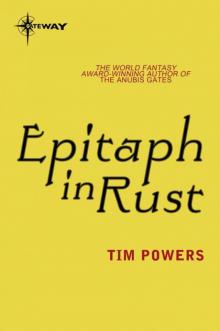 Epitaph in Rust
Epitaph in Rust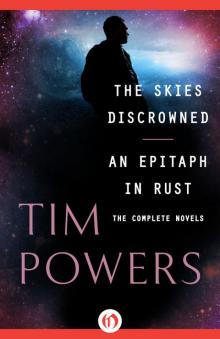 Skies Discrowned and An Epitaph in Rust
Skies Discrowned and An Epitaph in Rust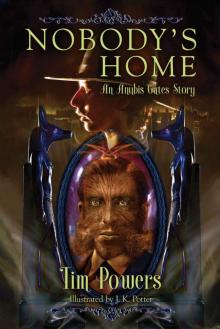 Nobody's Home
Nobody's Home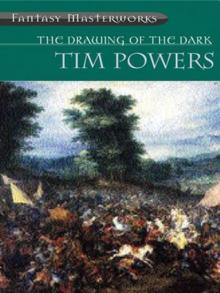 Drawing of the Dark
Drawing of the Dark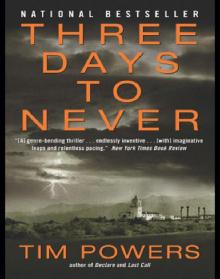 Three Days to Never
Three Days to Never